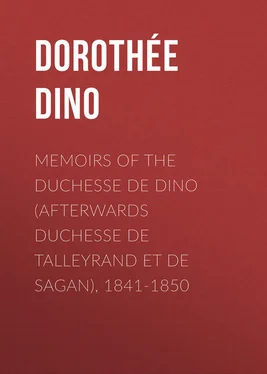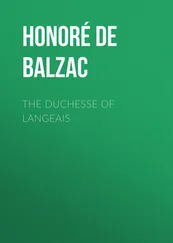Dino Dorothée - Memoirs of the Duchesse De Dino (Afterwards Duchesse de Talleyrand et de Sagan), 1841-1850
Здесь есть возможность читать онлайн «Dino Dorothée - Memoirs of the Duchesse De Dino (Afterwards Duchesse de Talleyrand et de Sagan), 1841-1850» — ознакомительный отрывок электронной книги совершенно бесплатно, а после прочтения отрывка купить полную версию. В некоторых случаях можно слушать аудио, скачать через торрент в формате fb2 и присутствует краткое содержание. Жанр: foreign_antique, foreign_prose, на английском языке. Описание произведения, (предисловие) а так же отзывы посетителей доступны на портале библиотеки ЛибКат.
- Название:Memoirs of the Duchesse De Dino (Afterwards Duchesse de Talleyrand et de Sagan), 1841-1850
- Автор:
- Жанр:
- Год:неизвестен
- ISBN:нет данных
- Рейтинг книги:4 / 5. Голосов: 1
-
Избранное:Добавить в избранное
- Отзывы:
-
Ваша оценка:
- 80
- 1
- 2
- 3
- 4
- 5
Memoirs of the Duchesse De Dino (Afterwards Duchesse de Talleyrand et de Sagan), 1841-1850: краткое содержание, описание и аннотация
Предлагаем к чтению аннотацию, описание, краткое содержание или предисловие (зависит от того, что написал сам автор книги «Memoirs of the Duchesse De Dino (Afterwards Duchesse de Talleyrand et de Sagan), 1841-1850»). Если вы не нашли необходимую информацию о книге — напишите в комментариях, мы постараемся отыскать её.
Memoirs of the Duchesse De Dino (Afterwards Duchesse de Talleyrand et de Sagan), 1841-1850 — читать онлайн ознакомительный отрывок
Ниже представлен текст книги, разбитый по страницам. Система сохранения места последней прочитанной страницы, позволяет с удобством читать онлайн бесплатно книгу «Memoirs of the Duchesse De Dino (Afterwards Duchesse de Talleyrand et de Sagan), 1841-1850», без необходимости каждый раз заново искать на чём Вы остановились. Поставьте закладку, и сможете в любой момент перейти на страницу, на которой закончили чтение.
Интервал:
Закладка:
As you are reading the little Fenelon, 17 17 Extract from a letter.
remember that I especially recommend the third and fourth volumes; I consider it is equal to Madame de Sévigné and La Bruyère. The whole work is pervaded with the inimitable grace and the fine and gentle austerity of the Christian bishop, an aristocrat, a man of God and of the world, whose intellect was terrifying, as Bossuet said.
I was starting in an hour and am very sorry to go. When and how shall I return? The unforeseen plays too large a part in the life of each of us.
Paris, April 6, 1841. – At length I am in this huge Paris and my impressions are by no means favourable.
Paris, April 9, 1841. – Madame de Lieven wrote asking me to come and see her, and I asked her to a quiet dinner with myself. She accepted the invitation and appeared in full dress, less thin than before, and in good spirits. She told me that her Emperor is as unsociable as ever; that the little Princess of Darmstadt cannot endure the climate of St. Petersburg and that the cold has given her a red nose; the young heir is by no means in love with her, but will marry her. The Princess assures me that nothing has been settled as regards diplomatic changes; that Sainte-Aulaire will go to London and Flahaut to Naples and the rest remains a matter of chance. It is thought that Palmerston is secretly encouraging the strange actions of Ponsonby, as the Eastern Question is by no means settled. Lord Granville has been obliged to resign on account of his health. Lady Clanricarde is very anxious to come to Paris, but the little Queen and Lady Palmerston do not like her; however, she has been reconciled to Lord Palmerston, whom she used to hate. It is said that the Queen would like to appoint Lord Normanby to Paris, as he is a weak member of the Cabinet.
M. Decazes is so ill that people are thinking of his successor. Some mention M. Monnier as a possibility, and I have heard other names which I do not remember.
Paris, April 10, 1841. – I should be glad to have something interesting to say of Paris, where the clash and strife of interests is so strong, but I have nothing and seem to be more vacant and listless even than at Rochecotte. Many words buzz about my ears and leave no impression and merely prevent the quiet course of my reflections.
Yesterday after lunch I called upon Madame Adélaïde. She had heard through a third person that I was at Paris and had asked me to come. I had not proposed to appear at the Château until after Easter. I found her ill and strangely changed; thin, bent, tired and grown old. She was very pleasant, but really harassing with her interminable discourse upon the fortifications. I think she must have sent for me to discuss this subject, as if I had any opinion upon it or as if my idea could be of any importance. I was more interested by the portrait of Queen Christina of Spain which she showed me and which is an agreeable picture. This Queen did not go to Naples because her brother would not receive her. She should now be at Lyons, and it is thought that she will come back here where the Court seems to be favourably inclined to her. For the stout Infanta there seems to be less liking, and she has not increased her popularity recently by sending her three eldest daughters into a convent for no obvious reason. Since her arrival here she took the three Princesses to balls and other social functions, and now shuts them up in this way.
M. Molé came to see me towards the end of the morning, and is very depressed upon the subject of politics. The fact is quite clear that no one has gained either power or reputation. The Court seems to have been so entirely committed to these wretched fortifications which no one wants, not even those who have voted for them, that the consequences have been almost ridiculous. Many people's feelings have been hurt on this question and all who did not promise their vote were ridiculed and insulted point blank. It is said that the Prince Royal has not spared himself in the matter. I am very sorry, as I shall always be about anything that may injure his position. At the present moment he is at St. Omer.
Paris, April 12, 1841. – Some one has just come in to tell me a sad piece of news. The pretty Duchesse de Vallombrose, who was quite young, was confined of her second child a few days ago and was attacked with puerperal fever two days later. The servant whom I sent to inquire for her was told that she died last night. It is very dreadful. The little schoolmistress of Rochecotte was cured of this same disease by country doctors, while the Duchesse de Vallombrose, with the whole of the faculty about her, dies in spite of their supposed science. Life indeed realises but little of what it promises.
Paris, April 13, 1841. – The death of the Duchesse de Vallombrose was yesterday a general subject of conversation. The unfortunate woman seems to have had no suspicion of her danger. A priest was fetched who, fortunately on this occasion, was a capable man (the Abbé Dupanloup), and was obliged to prepare her mind for this terrible conclusion. Deaths of this kind in the time of Louis XIV. would have produced sudden conversions, but nothing can effect the worn-out emotions and the dead consciences of our age, where everything is flat and dull, at home and abroad.
Paris, April 14, 1841. – M. de Sainte-Aulaire came to lunch with me yesterday to ask some questions concerning the nature of the London Embassy and its social position, as he is preparing to move thither. M. Royer-Collard came in before he had gone and they talked of the French Academy and of a new Book which M. Nodier is preparing, The History of Words . People say that it will be a curious and serious work, excellently written by a clever man, and a book of real authority.
M. Royer-Collard told me that on the day of his daughter's death his study door opened three times in a quarter of an hour to admit M. Molé, who was quite simple; M. Thiers, who was less so; and M. Guizot, who was nothing of the kind. Their meeting made the incident stranger still. M. Guizot fell upon the neck of M. Royer-Collard, pale and in tears, and the bereaved father felt too weak to keep him back, and I think he was quite right. Two of M. Guizot's children had been dangerously ill, and had been saved by the care of M. Andral. 18 18 Dr. Andral was a son-in-law of M. Royer-Collard.
M. Royer-Collard had called upon M. Guizot to congratulate him upon their recovery, and since that time when the two men met in the Chamber, they have shaken hands and exchanged a few words. As I am a supporter of peace in general, and think that the more we advance in life the more we should incline in that direction, I told M. Royer-Collard more than once that I was glad of the reconciliation.
My children came to dinner with me and after they had gone I went to bed. I might go into society if I pleased, or give receptions here, but I have an invincible dislike to these functions, and the hour during which I am at home to friends seems to me the longest in the day. Our dear M. de Talleyrand, whose insight was so profound and who spoke more truly of every one than I realised at the time, told me very correctly that when my children were married I should fall out of society. As a matter of fact I can no longer endure it. My priest, my White Sisters, my garden, my poor people and my workmen, are enough for me. What one knows as friends in society are quite uninteresting compared with them. Madame de Maintenon said, "My friends interest me, but my poor people touch my heart." I have often applied this phrase to my own case and understand its meaning fully.
Paris, April 16, 1841. – Yesterday the eldest daughter of the Duc de Rohan-Chabot, with whom we are connected, was married to the Marquis de Béthisy. It was a fine wedding, and all the high society of the Faubourg Saint-Germain were there. I was invited to the celebration. The Church of St. Thomas d'Aquin could hardly contain the crowd; the throng in the sacristy was overwhelming; people were elbowing one another on the steps, while the driving rain increased the confusion, far from diminishing the haste of the visitors to return home. The Abbé Dupanloup who daily baptizes, confesses, buries or marries some one from our quarter, uttered a discourse which was somewhat long, though it touched those who listened to it. But nearly every one was thinking of such wholly mundane affairs as dress and display. At Paris, and in our society, marriage is rarely an event of any solemnity, and the words of the priest are the only serious utterances amid the extreme frivolity, in which the marriage service can scarcely be heard. It was a sight which evoked more than one sad reflection, especially for those who remembered that in the same church the evening before the last prayers were said over the coffin of the young and beautiful Duchesse de Vallombrose.
Читать дальшеИнтервал:
Закладка:
Похожие книги на «Memoirs of the Duchesse De Dino (Afterwards Duchesse de Talleyrand et de Sagan), 1841-1850»
Представляем Вашему вниманию похожие книги на «Memoirs of the Duchesse De Dino (Afterwards Duchesse de Talleyrand et de Sagan), 1841-1850» списком для выбора. Мы отобрали схожую по названию и смыслу литературу в надежде предоставить читателям больше вариантов отыскать новые, интересные, ещё непрочитанные произведения.
Обсуждение, отзывы о книге «Memoirs of the Duchesse De Dino (Afterwards Duchesse de Talleyrand et de Sagan), 1841-1850» и просто собственные мнения читателей. Оставьте ваши комментарии, напишите, что Вы думаете о произведении, его смысле или главных героях. Укажите что конкретно понравилось, а что нет, и почему Вы так считаете.












